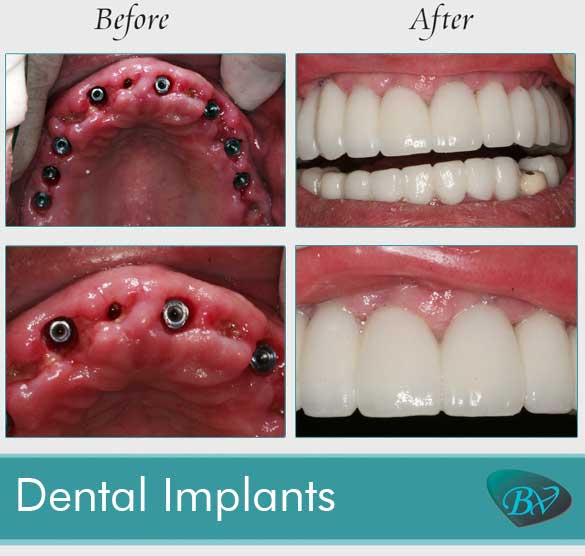The Main Principles Of Dental Sense
The Main Principles Of Dental Sense
Blog Article
Rumored Buzz on Dental Sense
Table of Contents4 Simple Techniques For Dental SenseNot known Details About Dental Sense 3 Easy Facts About Dental Sense ShownThe Best Guide To Dental Sense
are clinical tools surgically dental implanted right into the jaw to bring back an individual's capacity to chew or their appearance. They offer assistance for man-made (phony) teeth, such as crowns, bridges, or dentures. When a tooth is lost due to injury or condition, a person can experience complications such as fast bone loss, malfunctioning speech, or modifications to eating patterns that lead to discomfort.Dental dental implant systems are composed of an oral implant body and oral implant joint and may likewise include a joint addiction screw. Root canal procedure. The dental implant body is operatively put in the jawbone in area of the tooth's root. The oral implant abutment is usually connected to the dental implant body by the abutment fixation screw and prolongs with gums into the mouth to sustain the connected artificial teeth
(https://www.ted.com/profiles/48604569/about)Framework of The Dental Implant System choosing dental implants, speak with your dental supplier about the possible benefits and risks, and whether you are a prospect for the procedure. Points to think about: Your general wellness is an essential variable in determining whether you are a good candidate for oral implants, for how long it will take to recover, and how long the dental implant may remain in place.
Cigarette smoking may affect the healing procedure and reduce the long-term success of the implant. The healing process for the dental implant body might take several months or longer, throughout which time you generally have a temporary joint in location of the tooth. the oral implant procedure: Thoroughly comply with the oral health guidelines offered to you by your oral supplier.
Some Known Details About Dental Sense
Implant failure can lead to the demand for one more medical procedure to deal with or change the implant system. Restores the capability to chew Brings back cosmetic appearance Aids keep the jawbone from reducing due to bone loss Maintains the health of the bordering bone and gums Helps maintain nearby (close-by) teeth secure Enhances high quality of life Damage to bordering all-natural teeth during implant positioning Injury to the surrounding tissues during surgery, such as sinus perforation Injury during surgery (for instance, fracture of bordering jawbone) Poor feature, such as feeling like the teeth do not attack together normally A sensation that the tooth hangs or twisting in position arising from a joint screw loosening Implant body failing (looseness of the dental implant body) due to systemic infection, which may be a lot more likely in patients with uncontrolled diabetics issues due to local infection in bone and periodontals supporting the implant body due to delayed healing, which might be most likely in individuals that smoke Difficulty cleaning up the gums around the implant, causing bad oral hygiene Neglected gum condition Post-surgical numbness as a result of nerve impingement or damages Always alert healthcare carriers and imaging service technicians that you have dental implants before any magnetic vibration imaging (MRI) or x-ray treatments.
FDA is not aware of any adverse events reported for MRI or x-ray treatments with oral implants. Dental implants systems are normally made of products that comply with global agreement requirements of the International Organization for Standardization (ISO) or ASTM International. These requirements have details of what makes a secure product.

An oral implant is a structure that changes a missing tooth. With screw-like devices, the surgeon inserts a dental implant into the jawbone, and it acts as a support for a man-made tooth, called a crown.
Everything about Dental Sense
Some people are not eligible for dental implant surgery. It is for oral cosmetic surgeons to operate on individuals with: severe illnessuncontrollable metabolic diseasebone or soft tissue condition or infectionIf these issues are fixed, an individual can have the surgical procedure. In, dental specialists refrain from operating on people with: If people with go to this web-site any one of the above go through dental implant surgery, there is a higher threat of the dental implant falling short.

Oral implant surgery is a customized procedure. It's not the very same for every person. But the complying with offers a general summary of what you can expect your dentist, oral specialist, periodontist or prosthodontist to do: Put the dental implant operatively. Provide you time to heal. Attach the article and final crown, bridge or denture.
Next, your doctor will carefully position the oral implant into your jaw. If your implant is near the front of your mouth, your dentist will make a short-lived tooth for you to wear till you recover.
The Only Guide to Dental Sense
During the recovery stage, your jawbone must fuse to the oral implant. This procedure can take anywhere from three to 9 months.
Once your dental implant heals, your dentist can attach the abutment (tiny port post) and your final restoration (crown, bridge or denture). This generally takes concerning one hour to complete and may need a 2nd minor surgical treatment. You shouldn't feel any kind of pain throughout your oral implant procedure since your supplier will certainly utilize drug to numb your periodontals.
Report this page